We might be on the verge of a new internet. More and more internet users want to get rid of the current situation, where a few tech companies dominate the digital landscape. But we have not succeeded in deleting our accounts en masse. The power that tech companies have online also comes onto the radar of politicians. Are they going to help us with fixing the internet?
I asked Jan Hein Hoogstad how he sees the future of the internet. With his background as a philosopher and developer, Jan Hein looks at the internet both from a practical and reflective perspective. With his start-up Lefthoek, he is currently researching how AI can be used to better moderate and organise information. For Public Spaces—a coalition of several media and culture institutions that advocate for a new internet that strengthens the public domain—Jan Hein is working on the development of Public Badges. These badges will allow organisations to communicate what they are doing well on the internet, for example how transparent they are about their data-policies and how this is phrased in their terms and conditions. The organisations level of transparency will then be tested and eventually laid down in a badge. In the future, Public Spaces also wants to use the badges to map the values systems of websites and applications. By doing that, internet users will get insight into the values of the tools they use and websites they visit. For example, if you’re looking for a video call tool, you can choose what you find important: Do you care about privacy? Or is a stable call quality more important to you? A tool that fits your needs best roll out. With his work Jan Hein wants to make the internet a little better. He has many more ideas of how things can be improved. During our conversation via the stable Skype, he shared the following 10 thoughts with me:
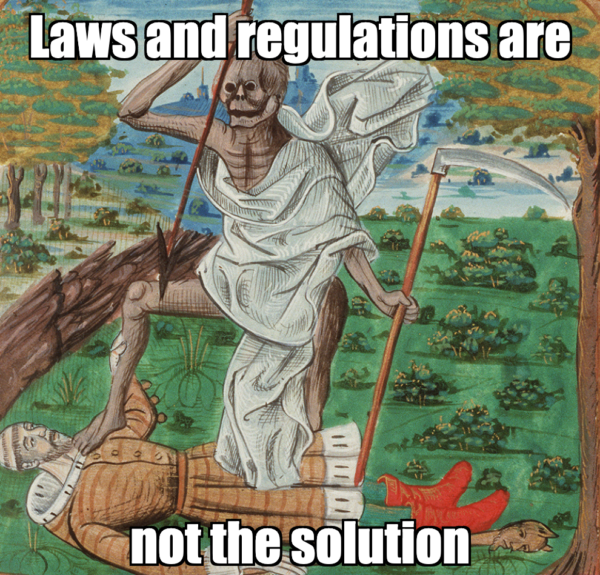
1. Laws and regulations are not the solution
JH: I’m not such a fan of laws and regulations in this area, because often the consequences have not been sufficiently thought through. Although I’m supporting the GDPR, I also experienced their downside during their introduction in 2018. At that time I was running a small start-up and these new regulations cost me one week of time and employees. That’s a huge investment for small businesses. While for Facebook, relatively speaking, it only takes like 5 minutes of work. For this reason, Mark Zuckerberg himself is probably in favour of laws and regulations, as they will allow him to become even more competitive. It will raise the threshold for startups and small businesses which also increases the entry level to take part in the digital economy. The introduction of these kinds of new regulations creates an environment where large companies come up with new ways to evade the law, instead of really democratising things or making things more open and transparent. We all know that the tax law makes it easier to avoid paying taxes when you have a lot of money than when you’re a small business. I think, we as internet citizens should appeal to the common goal we have together. If we have a consensus in those values, law and regulation is much less important.
LS: So we have to sit down with Mark Zuckerberg. But will a company like Facebook change the platform in a way that users would be better off? It’s likely that such adjustments will be at the expense of the business model they now have.
JH: Well, I don’t think we should sit around the table with Mark Zuckerberg. We need to sit around the table with smaller parties and see how they can improve their position.
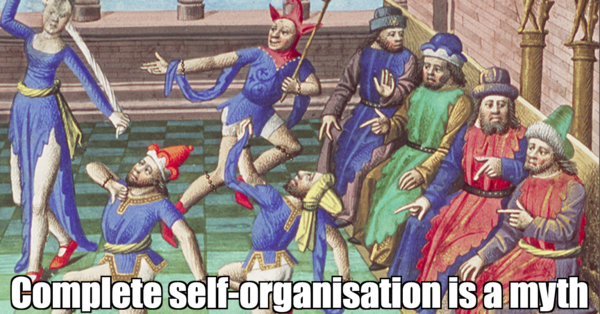
2. Complete self-organisation is a myth
JH: In 1994, I navigated through the internet by using ‘The Internet Yellow Pages’: sort of an index, in which you could find almost all the URLs that were available at that time. At that time, the idea was that it’s nice that the whole world can find each other without the intervention of commercial parties. But principles that work on a small scale don’t automatically work on a large scale. If there are 1000 websites, you can just list them in a phone book. But with the current internet this is impossible. This navigation through websites has been commercialised very quickly. On the early internet, people surfed through similar websites to thehmm.nl every day, but when you look at the most reached websites at the moment, most of them belong to big and commercial tech companies. This is not necessarily a bad thing, and I’m not against commercialism, but how we can reach each other is now completely in the hands of Google. In my opinion, it’s too easy to think: that’s the way it is. Maybe it’s my never-ending optimism, but I think we do have the power to change these processes. One of the most important things we’ve learned from being online for 30 years is that complete self-organisation is a myth. At the same time, planning completely or leaving it to commercial parties is also not the best solution. We have to find a middle ground in this.
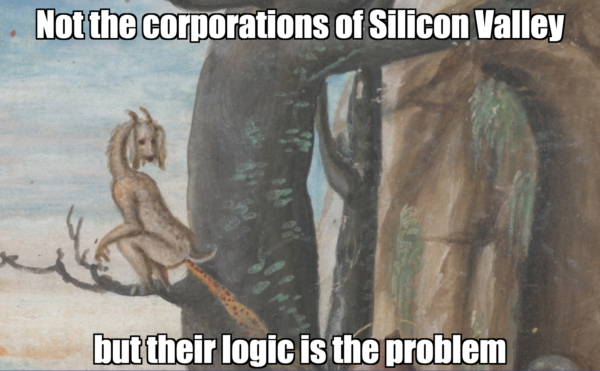
3. Not the corporations, but the logic of Silicon Valley is the problem
JH: We are now too focused on Big Tech companies such as Google and Facebook and I think we should look at the underlying structure. Facebook will disappear at some point. IBM’s hegemony also ended at some point and the company got a different role, just like Microsoft or MySpace. Ultimately, all those companies are just the result of certain kind of philosophies and those stay the same. One problem is the fact that data became a business model. But I’m more concerned about the investment model. In Silicon Valley, people always think in terms of exponential growth: we now have one user, tomorrow we will have two users, the day after four and if we continue that trend, we will have 15 billion users in 30 years. Everything is based on this logic, from financing to stock market values. Of course this is marketing. There are not even 15 billion people on the planet.
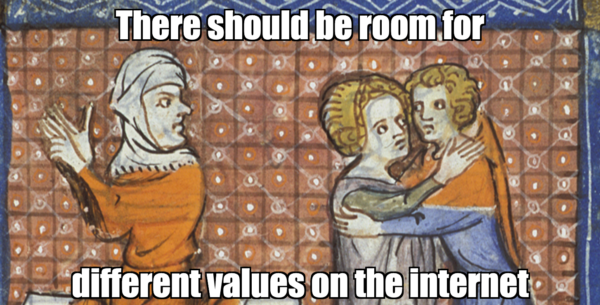
4. There should be room for different values on the internet.
JH: When we talk about values on the internet, I regret that we focus so much on privacy and data. I have been an internet user from the very beginning. In my attic room I was already logging into the forerunners of the internet, on AOLs and bulletin boards. To me, the promise of the internet has been, and will always be, a radical openness. I think it’s important that there is room for different values on the internet. Different people have different needs. That’s something I find very exciting at the moment. How can we respond to the people who want to protect their data? And how can we bring back some idealism, with the knowledge of what we’ve learned over the past 30 years? We can no longer be naive and think that we get a representative democracy when we open up Twitter. As a still very young system, compared to the national state, governments, and bureaucracies, the internet gives us many more opportunities to build something from the group up. The internet is still in a pioneering phase. How can we develop systems with the right balance between openness and privacy? And how do we ensure that people get freedom of choice, can establish communities and have the ability to influence this online world?
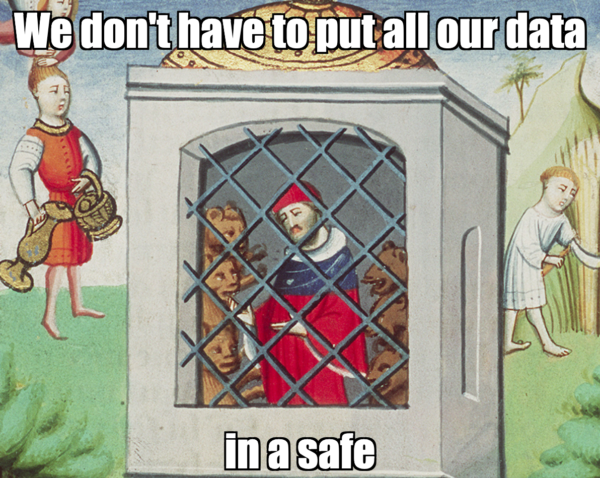
5. We don’t have to put all our data in a safe
JH: Encryption ensures we no longer think about which information is valuable and which is not. An iPhone now always has Military-Grade encryption, which means that every photo, every text message, and every emoji that we send is treated as if it were a state secret. I think we should think the same about our data as we do about our valuables. You put your jewellery in a safe, but not all of your things. By automatically securing everything with this strong level of security, we also deprive people of the opportunity to think about this for themselves. Personally, I don’t care about sharing certain data with the whole world.
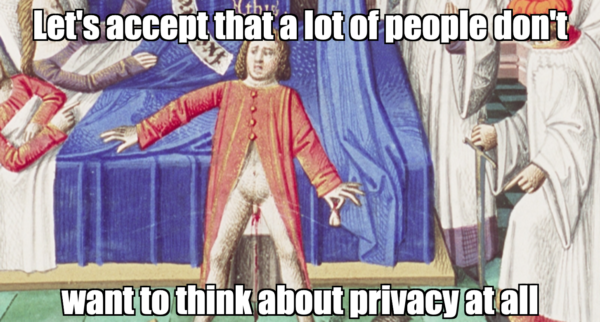
6. Let’s accept that a lot of people don’t want to think about privacy at all
JH: I think 80% of internet users don’t want to be confronted with complicated choices. They would prefer that politicians determine what is allowed and what is not, so that they don’t have to think about it themselves. The other 20% want more autonomy. They want to be able to think and be critically engaged. These two groups clash too much now. The 20%-group say to the 80%: “You have to become like us”, while the 80% really don’t want to. In my opinion these two groups can go well together. Just like some spend their holidays in an all-inclusive resort while others prefer to backpack. One is not necessarily better than the other.
LS: But, a big problem is that the 80%-group often is not aware of the workings of Big Tech companies. It is often not clear what kind of data is being gathered from our online behaviour.
JH: It also takes a lot of effort for me to have an understanding of that 80%-group, but I think even if they do know what data is being collected from them, they still want to go to the all-inclusive resort. And if you really think about it, that’s actually okay.
LS: But at that moment they all go to the same all-inclusive resort, it gives that resort tremendous power. The resort could suddenly decide to make a stay more expensive next year.
JH: Yes good point. In the sense of monopoly positions, the comparison with the all-inclusive resort is indeed not valid. The point I want to make is that we should celebrate the group that is willing or trying to make a better internet, instead of putting our energy into convincing a group that doesn’t care.
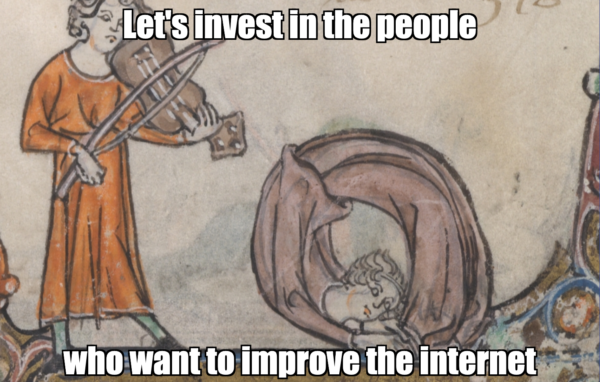
7. And invest in the group who want to improve the internet
JH: The 20%-group is super interesting. Really cool things happen here. More and more people talk about the read-write internet. This is based on the idea that the original intention of the internet was that users not only consume but publish. This is now being broadened to the maker- and developer sphere, where internet users consume, build, create, communicate and negotiate. I think this is what’s going to happen more in the 20% group. There will be smaller communities of people doing similar things: they will create software, hardware, and content, they are very active, and they propagate critical citizenship on the internet.
LS: And how do you think these small communities meet or spread their work? For example, you now see various journalists stepping away from major news media and starting their own newsletters, but to get subscribers for their newsletters they use social media. This is the same reason that we have an Instagram account with The Hmm, in addition to our own website.
JH: Yes, we need closed or semi-closed systems to produce meaning, but we need open systems to discover new things. How do we deal with bubbles? I think this is one of the most important questions of our time. It’s actually one of the problems we want to solve with Lefthoek. I think the circles we run in will become more fluid, and it will become easier to step into another bubble and leave again. We’re now researching how people who are on different, closed platforms (for example Microsoft Teams and Slack) can still exchange information with each other, without using one large platform. I think AI can play a good role in that.
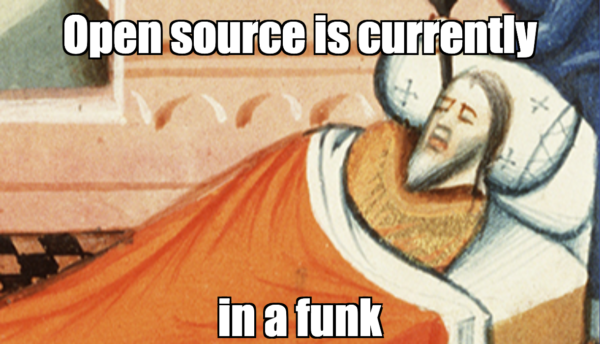
8. Open source is currently in a funk
LS: Do you already see a movement towards the read-write internet you described?
JH: We are currently in a funk, but it could also be a personal funk ;-). A few years ago I enthusiastically dove into the open source world and around that time, from 2010 to 2015, I experienced a period of flowering. Things like Arduino, the Internet of Things and open hardware came up. But now, that world has been taken over by large companies. There is hardly an open source project left that is not being backed by a large tech company.
LS: What do you mean by ‘being backed’?
JH: Open source projects are always community-owned, but sometimes the developers that work on the code get paid by large internet companies. This ensures these companies get a lot of decision-making rights. That is not just a bad thing. If Facebook needs a decentralised database which runs smooth day and night, you can’t say: “We’ll leave it to the community”. Facebook wants to influence it. But now the companies have too much power. An example: Tensorflow is the most important AI library and it is completely developed and managed by Google. The funny thing is that Google themselves use a different tool, because they don’t want to open certain things. Google hardly does open sourcing, but often opts for inner sourcing, which means that open source software development practices are used within a organisation, but the results are held for use within the company itself. When they develop a project, only a spin-off is available open source. For Google it’s very valuable to have Tensorflow widely distributed, for training and recruitment purposes. Engineers who come to work at Google and know how to work with Tensorflow already know how to work with the AI library they use with Google.
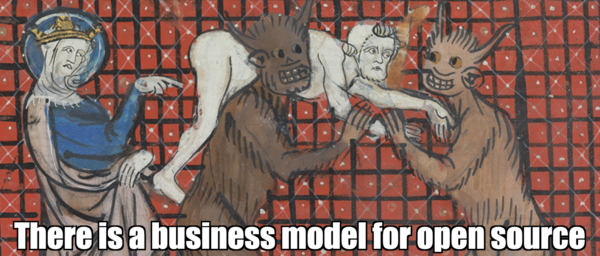
9. There is a business model for open source
JH: When we talk about how we can fix the internet, I think there’s much to be gained around revenue models for open source projects. The public sector spends a lot of money on IT projects, and a large part of that money goes to service contracts. With a service contract you do not pay for the code or the intellectual property, but for the people who provide services around these products. Organisations often choose closed source products for the wrong reasons. People think: ‘We choose Microsoft because then we know for sure that it is maintained and everything works well’. Actually, there won’t be much difference with service contracts for open source projects. Moreover, much of the underlying code of closed-source projects is open source. Service contracts for open source products do exist. Especially in the Linux- and Unix world it is very common. But for when we move away from the OS- and network level this does not happen on a large scale. Why? That depends more on the consumer side than on the provider side. People are afraid that open source software is unsafe and they don’t trust it when they don’t know the organisation behind it. As a result, unfortunately, many things are not available open source, or they have major drawbacks. For example: open source alternatives to Slack are Mattermost or Rocket.Chat—I can mention 6 more alternatives—, but none of them are a drop-in replacement. For instance, most of them require self-hosting which requires a lot of time, maintenance, and technical knowledge.
LS: Yes, that’s also the reason we’re having this conversation over Skype instead of Jitsi anyway;)
JH: Yes, now the solution is often to go back to services from large companies. This is why it’s important to think about other business models. What if corporations collaborate with an organisation that is building an open source tool, so this organisation does not buy a ready-made product but helps develop it? This doesn’t have to be more expensive, it can even be cheaper. Also safety and reliability can be improved. Now I notice that companies don’t want to spend any money on open source tools they use, but it’s not free of course. A fanatic developer is spending a lot of time and energy to make it work. If you ask me how the internet should change, I think we should develop a better model for that.
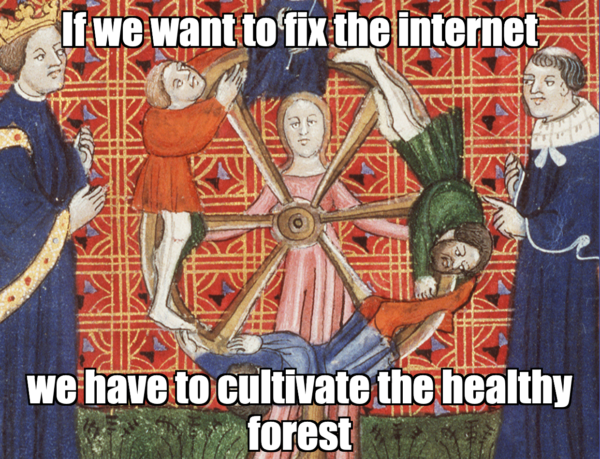
10. If we want to fix the internet, we have to cultivate the healthy forest
JH: Ideally, we will keep the sentiment of people who like to contribute code to open source projects without directly getting paid for it, and we will convince other internet users to pay for it anyway. But at the moment, there is a very unfair relation between those who produce code and those who profit from it. Open source is not just produced by well-paid programmers that happily contribute to side-projects. We should not close our eyes to the fact that a lot of code is produced under appalling conditions. I hope that in 10 years’ time the internet will look like the 20% imagined and then I secretly hope that we also can get the 80% with us. But that’s the next step. Now, we shouldn’t put our energy into convincing a group of something they don’t want at this moment. Let’s invest in that 20%, instead of convincing the 80%. Because that 20% is still doing a labour of love. My plea will always be: ‘How are we going to cultivate the healthy forest.’
LS: A healthy forest for the backpackers to hike in?
JH: Indeed! Although personally, I prefer a good bed at a nice, comfortable hotel.
The images accompanying this article are made with the Medieval Memes generator by Koninklijke Bibliotheek.